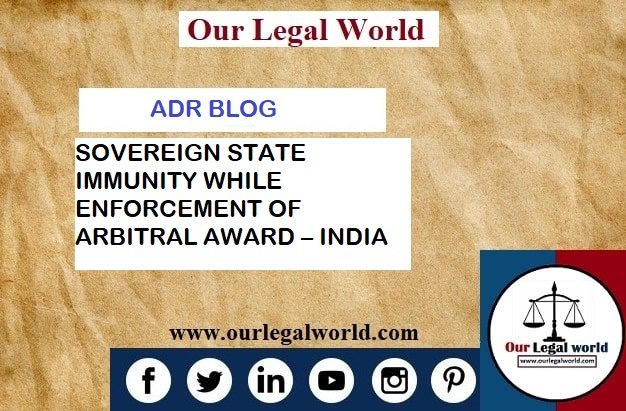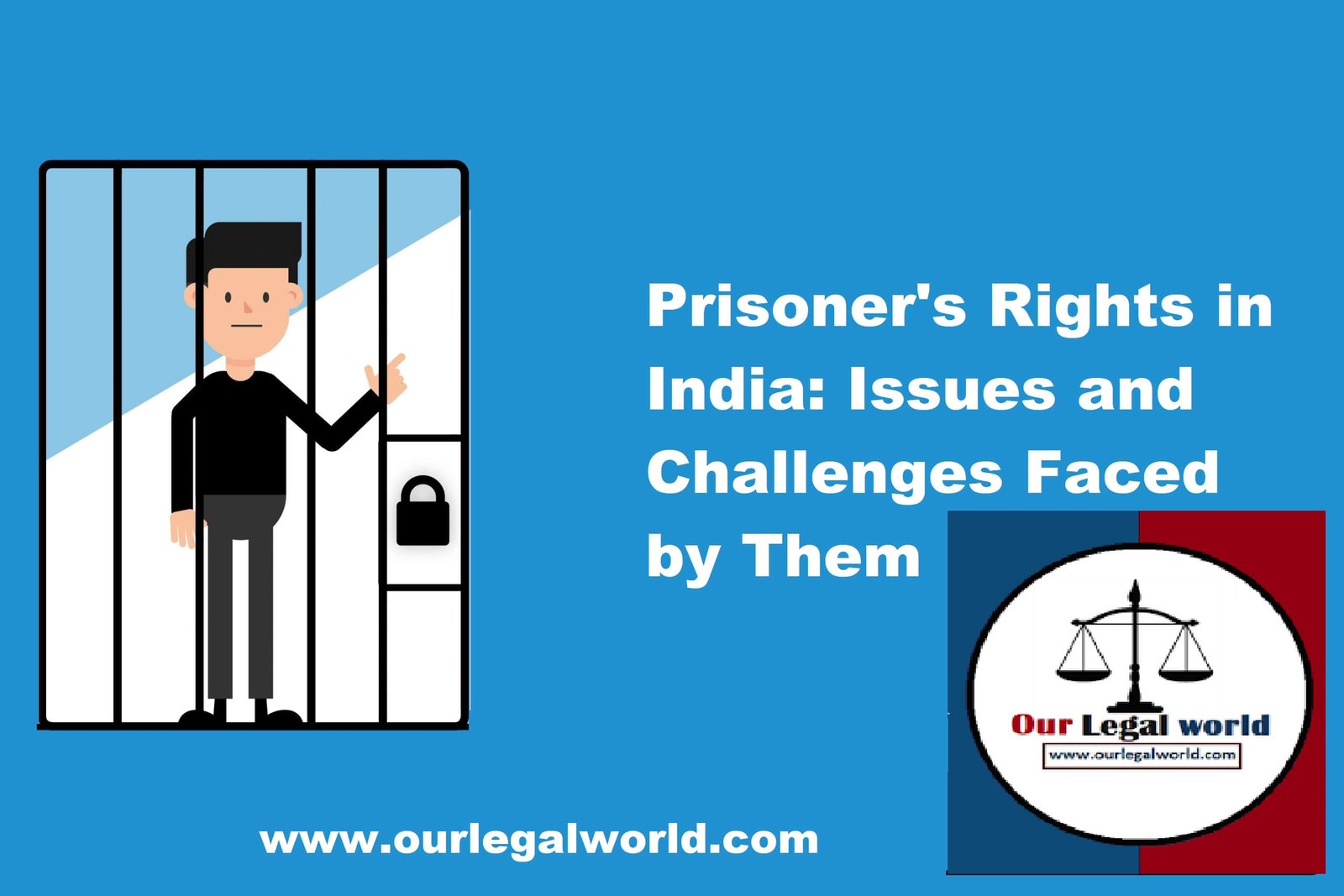SOVEREIGN STATE IMMUNITY WHILE ENFORCEMENT OF ARBITRAL AWARD – INDIA written by Adv. Ashish Panday
INTRODUCTION
The global economy increases cross-border economic activities, trade, and other commercial transaction and also increase commercial dispute, which needed an effective dispute settlement mechanism. Arbitration becomes the most effective mechanism in the commercial dispute from start with an arbitration agreement and ends with the award. The enforcement of the arbitral award in the domestic legal system always creates problems in many aspects one of them being enforced against the foreign state and its people. International law provides certain immunity to the state while during the institution of the suit and certain exceptions also applicable to the enforcement of an arbitral award but there is no uniformity of sovereign immunity in respect of the enforcement of the award but it varies in the domestic law of state but international principle followed in some extend.
In India, while foreign sovereign states and connected persons are generally entitled to claim immunity from jurisdiction in civil court proceedings, they are sued with the prior consent of the Central Government as per section 86 code.[1] But the question arises whether such exception applies in every state of a legal proceeding or not, and enforcement of the arbitral awards is not clear in many aspects. A continuing controversy in the enforcement of international commercial arbitration against the sovereign state, when they have Sovereign State Immunity.
QUESTION:
1. Are foreign sovereign states, and connected persons, entitled to assert immunity or other protection from measures to enforce, or to secure enforcement of, an arbitral award given against them (‘Enforcement Measures’)?
This paper analyse provision of the United Nations Convention on Jurisdictional Immunity to States and their Property, 2004 and Section 86 of the Code of Civil Procedure, for the finding the above-mentioned question.
ENFORCEMENT OF AWARD
The fruit of the arbitration proceeding is known as an arbitral award, the award stands on the same footing as a decree of the court, but the question arises during the foreign arbitral award enforces in the domestic law the foreign county. The one of the important conventions in respect of the enforcement of arbitral award is New York Convention which replace with Geneva Convention which applies to foreign arbitral awards the article I(1) of the said convention dealt with the awards made in the territory of any contracting state other than the one in which enforcement is sought.[2] The said the convention mainly apply to the between the private parties while recognition and enforcement of arbitral award. Article I(3), provide a contracting party can opt for the ‘reciprocity reservation’, whereby it will only apply the Convention to arbitral awards made in another contracting state.
However, the NY convention expressly does not talk about the enforcement against the state but its cover as well. This is one of the main reason that the New York Convention is silent of immunity.[3] Although India ratify the New York Convention in 1961, along with conventions there are various bilateral treaties which help to settled the commercial dispute between the foreign state and private entities, but New York Convention become very useful while the enforcement of award.
The arbitration award in an international commercial arbitration in India considered de facto be domestic award under section 36 of the Arbitration and Conciliation Act, 1996 and enforceable as same. The section 36 of the Arbitration Act itself create a legal fiction, there is not role of section 86 (CPC), in enforcement of such award. The New York Convention provide very limited ground of the refusal of enforcement of arbitral award.
Also Read: ROLE OF TAX TREATIES
SOVEREIGN IMMUNITY DURING THE ENFORCEMENT
Sovereign immunity is also known as a ‘sovereign equality’ (‘par in parem non habet imperium‘).[4] In other words its means that a sovereign state are not directly sued in any jurisdiction of another sovereign state without its prior approval. The doctrine have certain exception “commercial transaction” is one of them where sovereign can’t claim sovereign state in a stage of execution of arbitral award.
In India, there is a provision in domestic law for the foreign states and its connected person such as rulers, ambassadors, organs, departments, envoys, high commissioners instrumentalities are exempted under section, 86(4) of the CPC.[5] The exception is limited to institution of suit against the foreign state without prior permission of state.
The main question arises whether a foreign state claims sovereign immunity while the enforcement of the arbitral award against the foreign state and its related person. The answer of this question is dealt with by only a few international conventions and even in municipal legislation. In many countries, this doctrine has restrictive immunity with respect to the execution, under which only the property of the state is used for the sovereign purposes (acta jure gestionis). India also followed the same theory in the execution of the arbitral awards, judiciary played a very important role while interpreting sovereign immunity.
The Empire of Iran[6] and Philippine Embassy[7] cases in Germany court clarified that the denying of immunity from execution in certain types of property which is not a related to the sovereign function of the state.
In the case of KLA Const. Technologies Pvt. Ltd. & Ors. v. The Embassy of Islamic Republic of Afghanistan & Ors[8] Delhi High Court the explain the provision of consent under Section 86(3) of Code of Civil Procedure, the central government prior consent theory is not applicable during the enforcement of awards against the foreign state or its related person. The High Court relied on the judgement Uttam Singh Duggal & Co. Pvt. Ltd. v. United States of America, Agency of International Development in which the court explain the provision Section 20 of the Arbitration Act, 1940, and foreign State was immune from the jurisdiction of the Indian courts only when there is a sovereign or pubic act are involved in the transaction, there is no foreign state sovereign immunity in respect of the commercial transaction. The interpretation is based on that an application previous Arbitration Act, 1940 of under Section and was not a suit under Section 86(4) of the Code of the Civil Procedure.[9]
The KLA Const Technologies Pvt argument on the two ground:
- In a contract among the state and private entity for the commercial transaction, a foreign state cannot seek sovereign immunity to avoid the enforcement of an arbitral award rendered against it.
- No separate consent for enforcement is necessary, and consent to arbitrate is sufficient to wave the immunity
The section 86 of CPC does not implement international law doctrine of sovereign immunity in domestic legislation but it only provide additional exception under the code. The arbitration proceeding dose govern by the CPC but it has own international law principle in respect of sovereign and claim the immunity while enforcement of award.[10] The enforcement of ICA award can be made against the foreign state, and its non-sovereign property only. The state can’t claim the absolute immunity from the enforcement.
UNJISP 2004
The early to mid-twentieth century, followed the doctrine par in parem non in pareium there was an unanimity in international practice that sovereigns have absolutely immune in foreign court. As international economic activity grew, as states become more involved in the commercial activates, the status of the immunity restricted (acta jure imperii).
The “The United Nations Convention on Jurisdictional Immunities of States and their Property, 2004” but yet to be implemented the said convention. The said convention provide two type of immunities- jurisdiction and enforcement immunity. The Article 10 of said convention forbids a Foreign State from claiming Sovereign Immunity with respect of commercial transactions but it’s limited only to jurisdiction immunity. The professor James Crawford also said that “waiver of immunity from jurisdiction does not per se entail waiver of immunity from execution.”[11]
Article 17 of the convention provides that:
“If a State enters into an agreement in writing with a foreign natural or juridical person to submit to arbitration differences relating to a commercial transaction, that State cannot invoke immunity from jurisdiction before a court of another State.”
The Article 19 of the Convention, the said convention put prohibition for a Foreign State from claiming sovereign immunity in the face of post-judgment measures of constraint, such as attachment, arrest, or execution, against the State’s property in respect of commercial activities in cases arising, from an International Commercial Arbitration.
Both Article 17 and 19 UNJSIP Convention cleared the sovereign immunities in respect of arbitral proceeding and enforcement of the arbitral award against the state, in some extend but still there is a grey area in not article.
India is the signatory of the said convention, and many other counties but not in forced, India is not ratify this Convention. But still the judiciary use the various provisions from the convention to interpret the various cases with respect of International Commercial Arbitration. The reason behind that in last 30 years after LGP, the Indian economy integrated with the global economy, private player inter many commercial agreements with foreign states at that time if any issue settled through the arbitration, enforcement become very hard against the foreign state.
In New Central Jute Mills, Harbhajan Singh Dhalla v Union of India, Ethiopian Airlines, Qatar Airways v Shapoorji Pallonji & Co[12]. court also backed that there is no sovereign immunity claim in economic activities and breach of the agreement by foreign states, or their undertakings, or its people if any dispute arises. The International Commercial Arbitration help in settlement of dispute in the effective manner if no award enforced there is not value of entire proceeding.
UNJISP will play a important role in settling the dispute of sovereign immunity in respect of post-judgement immunity claim by the foreign state in the many aspect, the commercial aspect is one of them.
CONCLUSION
The international law/conventions such as Vienna Convention on Diplomatic Relations provide certain immunity or protection to the sovereign state and connected persons but nature of this right and protection change in the global economy. The state and its entities are involved in the lot of commercial activates, during the agreement among with the private individual state waiver its rights, in respect of commercial transaction. Thus agreements contained International Commercial Agreements provision, state participate in the arbitration proceeding, if state loss the arbitration and during the enforcement state claim sovereign immunity at that time.
The enforcement of award of International Commercial Arbitration in under section 36 of the Arbitration Act, considered as a domestic award, as enforceable in the court. The foreign state have claim with the respect of the sovereign act or work of the state and sovereign property of the state, they can’t claim immunity of the state commercial activities.
This paper identify the some grey area in respect of enforcement of arbitral award against the foreign state and connected person, and the scope of applicability of sovereign immunity, still various convention is silent in this respect. After the enforcement of UNJSIP many issue will resolve.
Ashish Panday is a practicing Advocate in Delhi
[1] Section 86 CPC 1908
[2] Article I(1) – Provisions – NYCG 1958, https://newyorkconvention1958.org/index.php?lvl=cmspage&pageid=12&menu=675&opac_view=-1 (last visited May 1, 2022).
[3] Khanapoj Joemrith, ENFORCING ARBITRAL AWARDS AGAINST SOVEREIGN STATES, 334.
[4] Article 1 of the Montevideo Convention on the Rights and Duties of States (adopted 26 December 1933, entered into force 26 December 1934
[5] Section 86(3) of Code of Civil Procedure, 1908
[6] Empire of Iran case, German Federal Constitutional Court, 30 April 1963, UN Legal Materials, 282, 45 ILR 57
[7] The Philippine Embassy case, 46 BverfGE, 342; 65 ILR 140; UN Legal Materials 297 13 December 1977, at 395
[8] OMP (ENF.) (COMM.) 82/2019 & EX.APPL.(OS) 901/2021
[9] Sovereign Immunity Not A Defence Against Enforcement Of Arbitral Awards: High Court Of Delhi – Civil Law – India, https://www.mondaq.com/india/civil-law/1088396/sovereign-immunity-not-a-defence-against-enforcement-of-arbitral-awards-high-court-of-delhi (last visited May 1, 2022).
[10] Ethiopian Airlines vs Ganesh Narain Saboo Civil Appeal No. 7037 of 2004
[11] James Crawford, Execution of Judgments and Foreign Sovereign Immunity, 75 American Journal of International Law 820–869 (1981).
[12] Writ Petition N. 67 of 1985








